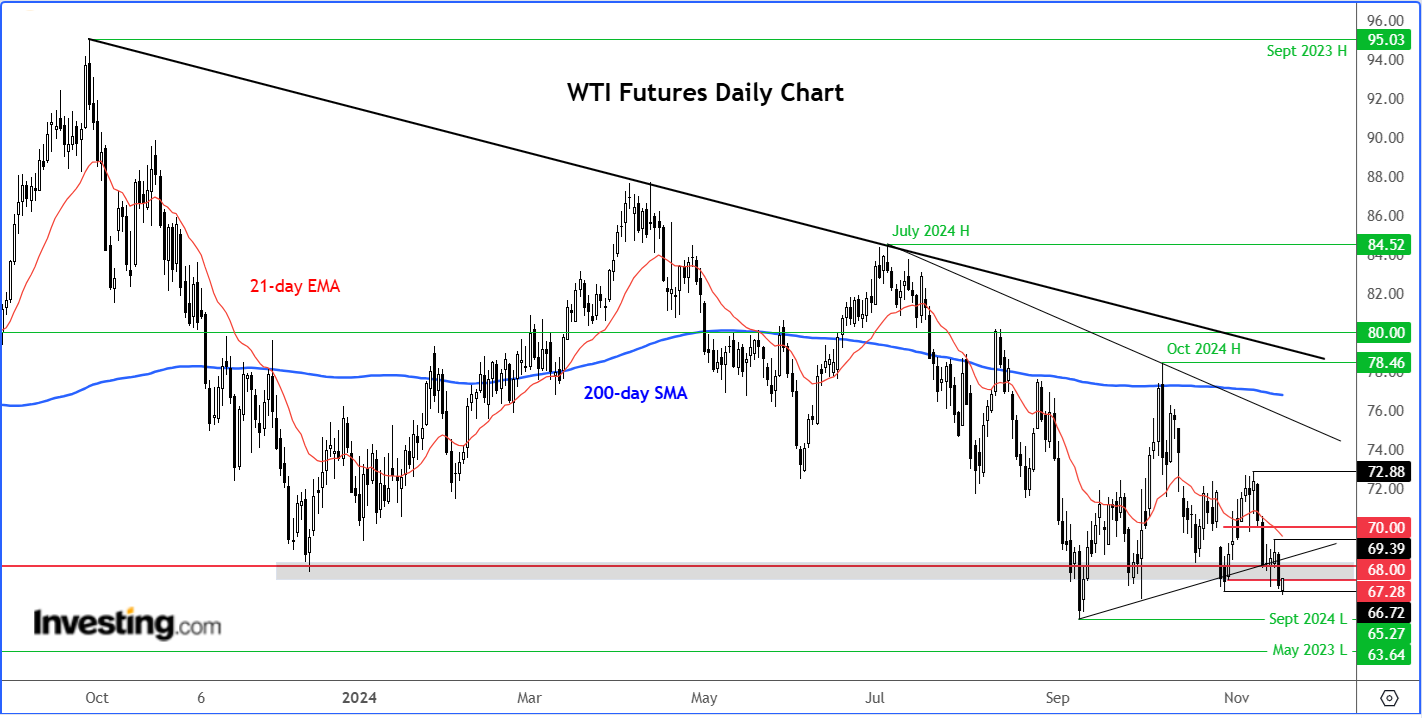- Crude oil prices are pressured downward by rising supply and limited demand, with geopolitical risk premiums decreasing post-Trump's election.
- A potential surplus is expected in 2025 due to weak demand from China and increased non-OPEC production.
- Technical analysis suggests WTI oil prices may face resistance, favoring bearish trends unless a significant reversal occurs.
- Get ready for massive savings on InvestingPro this Black Friday! Access premium market data and supercharge your research at a discount. Don't miss out - click here to save 55%!
Crude oil prices rebounded Monday morning after Friday’s 2% drop. Last week saw prices drop around 4% to push prices in the red on the month, after snapping a 3-month losing streak in October.
But against a backdrop of rising supply and limited demand growth, and oils’ ongoing bearish technical trend, the path of least resistance remains to the downside, and I would be surprised if a breakdown does not occur in the coming days, unless we see a surprise supply side shock.
Sentiment towards crude oil has turned bearish since Trump’s election victory, and amid growing signs of excess surplus coming from non-OPEC producers. There are now some concerns that if the OPEC+ cannot agree to extending their production agreement next month, this could give rise to fresh selling. At best, we could be looking at subdued prices in the coming months, until either demand growth picks up with the global economy, or oil production growth slows.
Supply concerns and lower geopolitical risk premium
Given the rise in non-OPEC supply growth, the OPEC+ will be under pressure to support prices. But the group has said that it will gradually restore withheld supplies after multiple delays. What’s more, we could see a sharp rise in US drilling activity under Trump’s plans. As a result, we could potentially see a boost in both OPEC and non-OPEC production by 2025 and beyond.
Additionally, Trump’s victory has led to geopolitical risk premiums being priced out – a trend reflected in the recent drop in gold prices. This shift stems from Trump’s promises to end ongoing conflicts, with markets seemingly optimistic about his ability to broker peace deals in the Middle East and between Ukraine and Russia. However, whether he can deliver on these pledges and the timeline for achieving them remain uncertain. For now, it appears traders are offloading oil first and saving their questions for later.
Crude oil market heading for surplus in 2025
Indeed, last week, the IEA predicted that the oil market looks like it’s in for a surplus next year. The group envisages the surplus to be in excess of over a million barrels a day—thanks largely to China’s weakening demand, where demand has fallen for six months straight.
Demand growth in China is now growing at just a tenth of its 2023 rate. Meanwhile, growth in oil production from the non-OPEC producers, most notably the US, Brazil, Canada, and Guyana, are adding to signs of excess supply-side concerns.
The IEA thinks that this year’s oil demand increase will only reach 920,000 barrels a day—less than half of last year’s growth rate—and next year’s rise doesn’t look much better, capped at around 990,000 barrels a day.
Demand concerns intensify
By its own accord, the OPEC recent also cut its oil demand growth forecast for the fourth month in a row thanks to weak oil demand in China, the world’s largest oil consumer. But the OPEC+ is also ready to potentially inch production back up, starting with a modest 180,000-barrel increase planned for January. They’ll review this when they meet on December 1, and there is a good chance they could postpone this increase yet again, should prices fall further by then.
WTI technical analysis and trade ideas
Until we see a clear reversal pattern in prices, the path of least resistance will remain to the downside even if pries are higher at the time of writing. That’s because we are looking at a market with lower lows and lower highs, one where the moving averages have negative slopes and price action looking heavy.
Every time oil has tried to rally in recent weeks, the sellers have stepped in to slam prices back down. That trend could continue this week after WTI’s positive start today.
On WTI futures chart, the key resistance area to watch is between $67.30 to $68.00, a recently broken support area. The bears would be looking to step in around these levels to maintain full control. If they successfully defend this area, then the next downside target could be the September low of $65.27. Below that level, you have the May 2023 low at $63.64, but why stop there? So, we could see a sharp drop, if today’s earlier low gives way at some point this week.
Meanwhile, in the event we see a more meaningful recovery today, then there is a possibility we could see WTI futures head back to $70.00 where prices might encounter stronger resistance.
Key takeaway point
The long and short of it is that lackluster economic conditions and a growing shift to clean energy are reining in demand growth, at a time while supplies are rising and expected to get another boost under Trump. Against this backdrop, it is difficult to be positive on oil prices in the near-term outlook.
It makes more sense, therefore, for traders to be looking for bearish setups near resistance than bullish setups at support.
***
Disclaimer: This article is written for informational purposes only; it does not constitute a solicitation, offer, advice, counsel or recommendation to invest as such it is not intended to incentivize the purchase of assets in any way. I would like to remind you that any type of asset, is evaluated from multiple perspectives and is highly risky and therefore, any investment decision and the associated risk remains with the investor.
